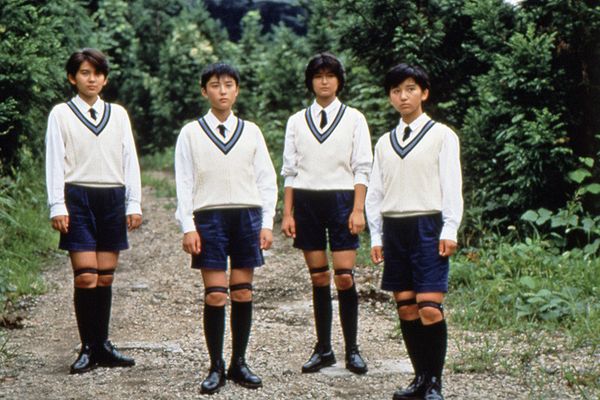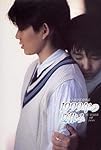Eye For Film >> Movies >> Summer Vacation 1999 (1988) Film Review
Summer Vacation 1999
Reviewed by: Jennie Kermode

Is it the truth, or a romantic fiction? If the latter, who is telling the story? The vignette at the start of Shûsuke Kaneko’s much-loved manga adaptation packs in every available Gothic cliché. A lonely boy plays the piano late at night, by the light of an oil lamp. He’s disturbed by a sudden gust of wind, which sets white curtains billowing. Leaving the room, he walks along a corridor, slips an envelope under a door, then exits the mansion as a grandfather clock chimes ominously. It’s even a full moon. He’s going to throw himself into the lake, and that’s what we seem to see. But is it what it seems?
Skip forward three months. The school – for that’s what the building is – has emptied for summer vacation, all but for three boys who have nowhere else to go. Seniors Kazuhiko (Tomoko Ôtakara) and Naoto (Miyuki Nakano), together with junior Norio (Eri Fukatsu), have been left to look after themselves, with rations delivered weekly and not an adult in sight. They’re all still haunted by what happened to Yu (Eri Miyajima), the boy from the opening scenes, and their attempts to deal with all this flounder when a new kid arrives, going by the name Kaoru, who is his spitting image.
If you’re familiar with Japanese names, you’ll have noted that all these boys are played by girls. Young as they are, it’s not particularly visible, but it adds a certain delicacy of feature popular with otaku, and it suits the original source material – Moto Hagio’s The Heart Of Thomas – whose young heroes look distinctly feminine. It may also have helped to work around any embarrassment in either cast or old-fashioned viewers in light of the nature of the relationships between some of the boys.
Everybody knew, Norio tells the new boy, that Yu was in love with Kazuhiko, but Kazuhiko didn’t feel the same way. He blames Kazuhiko for Yu’s death, though it’s not clear if he means it metaphorically or literally; he also admits that he dislikes the older boy partly because he’s so popular. Naota now seems to be in love with Kazuhiko too, and Norio is at that odd age where, having yet to be hit by adolescent hormones, he is in many ways better equipped to approach life in a rational manner than those who are older than him. Feeling like an outcast because of his age, and missing Yu because he was the only boy who was ever nice to him, he strives to make himself useful and thereby win some respect, at one point struggling to make omelettes in a giant pan which he can barely lift.
As the boys wander around the school, its overgrown herb garden and surrounding wild spaces, assorted emotionally intense dramas play out between them. Kaoru is the subject of constant speculation. Yu’s body has never been found. Could he be Yu in disguise, or could he be a ghost? He’s angered by the accusations, as anyone might be. Kazuhiko, haunted by guilt and unable to escape the feeling that he’s been given a second chance, gradually becomes obsessed with the new boy, much to the resentment of the others.
Whilst Kaneko borrows some of the visual language of Picnic At Hanging Rock, especially in the way that he photographs the interiors of the building and the small details of the natural world, there are also echoes of Lord Of The Flies here. Though the focus of the games being played is different, emotions run just as high, and there’s the same sense that, without anybody to bring the boys back to their senses, something terrible might happen. Contributing to this are the film’s extra-textual references, most notably the playing up of similarities between Yu’s mysterious fall and that of filmmaker Juzo Itami, who was found dead just a year before it was shot. The interweaving of art and music brings more than one kind of love into the picture, and the way that Kaoru and Kazuhiko are treated allows for reflections on the experience of celebrity.
Despite all this, the film is very much its own thing. It finds additional potency in styling itself as a prequel of sorts – not to any other film, but to the untold stories of later life. The white sheets which cover all the furniture in the school remind us that the building is waiting for something to happen. Repeated shots of train tracks and the use of sound without the sight of the train (or, elsewhere, children) add to this impression of distance from the real world coupled with unstoppable movement through time. Alternatively, of course, one might wonder if all the boys are dead and trapped in this place where once they were happy, playing out their tragedies over and over again.
A festival hit in its home country on release, Summer Vacation 1999 was chosen for a retrospective screening at Queer East 2024 in London. It has proven to be an enduring fan favourite with deep appeal for young LGBTQ+ people in Japan, where attitudes to same sex romance are sharply divided by generation. Now that those who fell in love with it on release can look back on it with the same nostalgia through which its story is filtered, it’s clear that the new, inclusive culture has staying power – but the film reminds us that even in the absence of prejudice, there will still be broken hearts.
Reviewed on: 21 Apr 2024















